
Digest Journal of Nanomaterials and Biostructures
metrics 2024
Bridging Disciplines with Cutting-edge Research in Nanoscience
Introduction
The Digest Journal of Nanomaterials and Biostructures, published by VIRTUAL CO PHYSICS SRL, is a premier open-access journal since 2006, focusing on the dynamic intersections of nanotechnology, biostructures, and material science. Based in Romania, this journal caters to a diverse readership of researchers, professionals, and students in fields such as nanoscience, biomedical engineering, and condensed matter physics. Despite its current Q4 ranking in multiple categories, including Atomic and Molecular Physics and Structural Biology, the journal serves as a valuable platform for disseminating innovative research and fostering collaboration across scientific disciplines. The journal’s commitment to open access ensures that groundbreaking findings in nanomaterials are readily available to a global audience, reflecting the increasing importance of interdisciplinary research in addressing contemporary challenges. With its ongoing evolution and the potential for high-impact contributions to the scientific community, Digest Journal of Nanomaterials and Biostructures plays a crucial role in advancing knowledge and innovation in its respective fields.
Metrics 2024
 0.20
0.20 1.00
1.00 1.00
1.00 54
54Metrics History
Rank 2024
Scopus
IF (Web Of Science)
JCI (Web Of Science)
Quartile History
Similar Journals
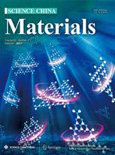
Science China-Materials
Unveiling Breakthroughs in Material Development.Science China-Materials is an esteemed peer-reviewed journal dedicated to advancing the field of materials science, published by SCIENCE PRESS. With a strong focus on innovative research and applications, this journal provides an essential platform for disseminating groundbreaking findings in materials development, characterization, and engineering. Since its inception, Science China-Materials has achieved an impressive Q1 ranking in the Materials Science (miscellaneous) category, reflecting its commitment to quality and the impact of its publications, as indicated by its 86th percentile ranking in Scopus. The journal is set to converge its contributions from 2016 to 2024, making it a vital resource for researchers and professionals interested in the latest advancements and trends in materials science. As an open access publication, it ensures that knowledge is freely available to a global audience, promoting collaboration and innovation across disciplines. The journal is headquartered in Beijing, China, and continues to attract high-quality submissions from leading experts in the field.
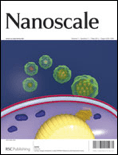
Nanoscale
Exploring Breakthroughs in Nanoscale Research.Nanoscale is a premier academic journal published by the Royal Society of Chemistry, dedicated to advancing the field of nanoscience and nanotechnology. With both its ISSN (2040-3364) and E-ISSN (2040-3372) ensuring wide accessibility, the journal is renowned for its high-impact research contributions, reflected in its impressive 2023 Impact Factor and prestigious Q1 ranking in both Materials Science (Miscellaneous) and Nanoscience and Nanotechnology categories. Since its inception in 2009, Nanoscale has fostered a collaborative platform where leading researchers from around the globe share their innovative findings across a multitude of topics spanning from material synthesis to applications in nanotechnology. The journal not only serves as a valuable resource for professionals, researchers, and students but also actively engages the academic community in discussing emerging trends, thus shaping the future of nanoscience. Situated in the heart of the UK at Thomas Graham House, Science Park, Milton Rd, Cambridge CB4 0WF, Nanoscale remains a key publication for those looking to keep abreast of the latest breakthroughs in an ever-evolving field.

Nano Express
Exploring the cutting-edge of nanomaterials.Nano Express is an esteemed open-access journal published by IOP Publishing Ltd, dedicated to advancing research in the fields of nanotechnology and materials science. Since its launch in 2020, the journal has swiftly established itself as a vital resource for researchers and professionals, garnering significant recognition in various domains, including biomaterials, electronic, optical and magnetic materials, and polymers and plastics. With a commendable categorization in Scopus quartiles, it ranks in Q2 for Electronic, Optical and Magnetic Materials, and maintains a top percentile in several others, exemplifying its commitment to high-quality research dissemination. Located in the United Kingdom, this journal fosters a global dialogue among experts and newcomers alike, facilitating open access to innovative research that drives the future of nanotechnology. By offering a platform for groundbreaking studies and reviews, Nano Express aims to bridge the gap between theoretical understanding and practical application, championing the development of next-generation materials that have the potential to transform various industries.

MRS Advances
Advancing the Frontiers of Materials ScienceMRS Advances, published by Springer Heidelberg, is an esteemed academic journal that serves as a vital platform for disseminating cutting-edge research in the fields of condensed matter physics, materials science, and mechanical engineering. With an ISSN of 2731-5894 and an E-ISSN of 2059-8521, the journal is hosted in Switzerland and encompasses an impressive spectrum of innovative studies that impact both theoretical and practical applications. Throughout its converged years from 2012 and continuing through 2024, MRS Advances has established itself with notable rankings, including Q4 in condensed matter physics and Q3 in several related categories. This journal not only enriches the academic community with its rigorous peer-reviewed articles, but also encourages open discussions that further advance research innovations. Although currently not designated as an open-access journal, its accessibility through institutional subscriptions ensures that professionals, researchers, and students can engage with the latest advancements in the material science arena. Emphasizing its relevance, MRS Advances is dedicated to fostering interdisciplinary collaboration and inspiring new discoveries within the global research community.

APPLIED PHYSICS A-MATERIALS SCIENCE & PROCESSING
Exploring the Frontiers of Materials InnovationApplied Physics A: Materials Science & Processing, published by Springer Heidelberg, is an esteemed academic journal that has been at the forefront of innovative research since its establishment in 1995. With a strong focus on the intersection of physics, materials science, and engineering, this journal explores cutting-edge developments and applications that influence contemporary materials research. Categorized in the Q2 quartile across both Chemistry and Materials Science, it boasts respectable rankings in Scopus, affirming its influence and reach within the academic community. Although primarily a subscription-based journal, it is dedicated to disseminating high-quality research findings that advance our understanding in these fields. Researchers, professionals, and students alike can benefit from the journal's commitment to publishing comprehensive studies, methodological advancements, and insightful reviews that push the boundaries of knowledge in materials science.
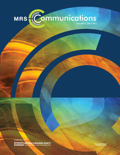
MRS Communications
Empowering researchers to share transformative materials knowledge.MRS Communications is a prominent academic journal published by Springer Heidelberg, focusing on the multidisciplinary field of materials science. With ISSN 2159-6859 and E-ISSN 2159-6867, this journal has been a valuable platform for disseminating cutting-edge research since its inception in 2011. Operating from its esteemed headquarters in Heidelberg, Germany, it aims to foster collaboration and innovation among researchers and practitioners by publishing high-quality, peer-reviewed articles. Holding a Q3 ranking in the Materials Science (Miscellaneous) category, and currently positioned at the 37th percentile in the general materials science field, MRS Communications is dedicated to advancing the understanding of materials through interdisciplinary studies. The journal offers researchers an opportunity to share insights that bridge theoretical knowledge with practical applications, contributing significantly to the global materials science community. As an essential resource for researchers, professionals, and students alike, we invite you to explore the latest advancements and discussions in materials science through this influential publication.
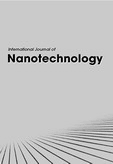
International Journal of Nanotechnology
Fostering Collaboration and Discovery in NanoscienceInternational Journal of Nanotechnology, published by INDERSCIENCE ENTERPRISES LTD, is a prominent academic platform dedicated to advancing research in the rapidly evolving field of nanotechnology. With an ISSN of 1475-7435 and an E-ISSN of 1741-8151, this journal has been contributing valuable insights and innovative findings since its inception in 2004. Although currently not an open-access publication, it serves as an essential resource for researchers, professionals, and students alike, encompassing critical areas such as bioengineering, condensed matter physics, and materials science. The journal is indexed in Scopus, highlighting its academic rigor, albeit ranking in the lower quartiles across several categories. As it progresses towards its 2024 milestone, the International Journal of Nanotechnology continues to play a crucial role in fostering collaborative scientific discourse and pushing the boundaries of knowledge in nanoscience. With a distinguished reputation in the United Kingdom and beyond, it is a vital tool for anyone looking to stay at the forefront of nanotechnology advancements.
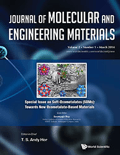
Journal of Molecular and Engineering Materials
Exploring the Nexus of Molecular Science and EngineeringThe Journal of Molecular and Engineering Materials, published by World Scientific Publishing Co Pte Ltd, is a leading peer-reviewed journal that focuses on the intricate relationship between molecular science and engineering practices. With the ISSN 2251-2373 and E-ISSN 2251-2381, this journal aims to foster the exchange of cutting-edge research and developments within the fields of materials science, molecular engineering, and related applications. Although the journal currently does not operate under an Open Access model, it remains a vital resource for researchers, professionals, and students seeking in-depth knowledge and innovative methodologies in material design and engineering. The journal's esteemed reputation is reflected in its commitment to publishing high-quality research that addresses contemporary challenges and opportunities in material science, thereby contributing to advancements in technology and industry.

Accounts of Materials Research
Catalyzing interdisciplinary collaboration in materials research.Accounts of Materials Research is a premier journal published by the American Chemical Society, focusing on the multidimensional field of materials science. With a robust impact factor and a commitment to open-access research, it serves as a vital platform for leading-edge discoveries from 2020 to 2024. The journal has rapidly ascended to the top quartile in multiple categories, including Chemical Engineering, Materials Chemistry, and Polymers and Plastics, demonstrating its significant influence within the academic community. Recognized by Scopus as a key resource—with remarkable rankings that place it in the 95th percentile of its field—Accounts of Materials Research is devoted to publishing high-quality, innovative research that addresses critical challenges in materials development and implementation. This journal is essential for researchers, professionals, and students seeking to stay informed about the latest advancements and collaborative opportunities within the interdisciplinary landscape of materials science.

JOURNAL OF CLUSTER SCIENCE
Innovating Insights Across Chemistry and PhysicsJOURNAL OF CLUSTER SCIENCE, published by SPRINGER/PLENUM PUBLISHERS, is a prominent and influential journal in the fields of Biochemistry, Chemistry, Condensed Matter Physics, and Materials Science. With an ISSN of 1040-7278 and E-ISSN of 1572-8862, this journal has been contributing to scientific discourse since its inception in 1990 and continues to publish cutting-edge research through 2024. It holds a respectable position in the academic landscape with its category quartiles indicating a Q3 ranking in Biochemistry and Q2 rankings in Chemistry, Condensed Matter Physics, and Materials Science as of 2023. The journal's noteworthy Scopus rankings further underscore its relevance, particularly a rank of #82 in Condensed Matter Physics, showcasing its impact and the quality of research disseminated. Although it does not currently offer open access options, it remains a key resource for researchers, professionals, and students who are invested in understanding the complexities of cluster science and its interdisciplinary applications.